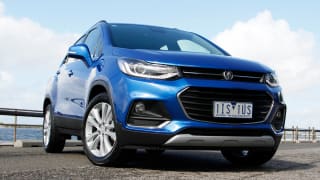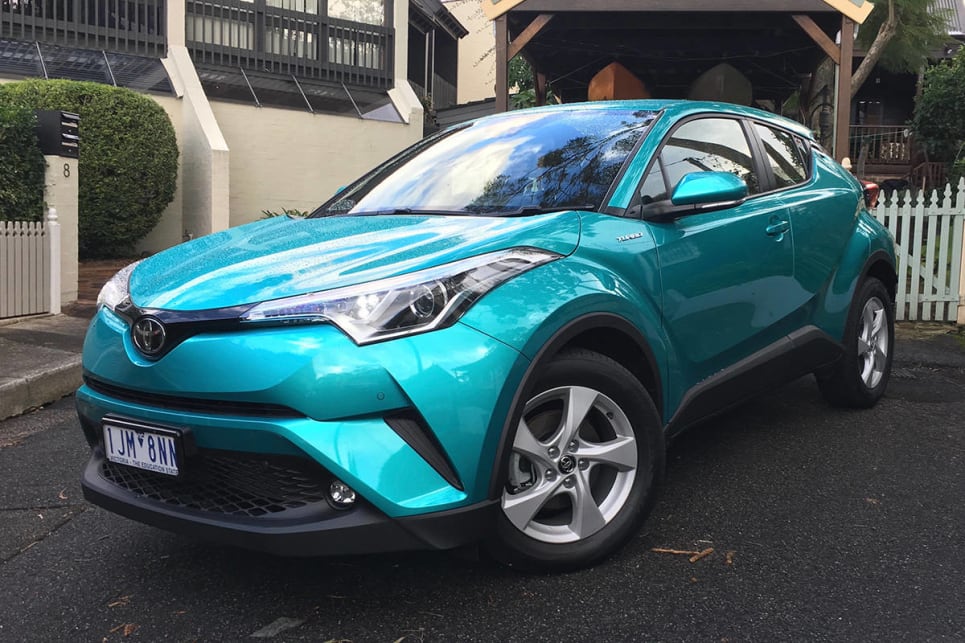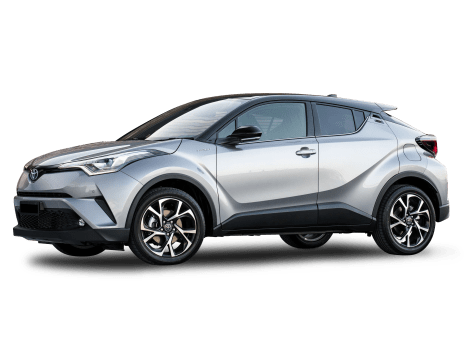
Holden Trax LTZ 2017 review
Holden's Trax was one of the earlier entrants in the mini SUV segment, put together with the bones of an unsuspecting Barina.
Browse over 9,000 car reviews

There is so much that is bizarre and almost incomprehensible about the C-HR that it's hard to know where to start, but most people choose a look of slack-jawed, what-the-hell-is-that dumbfoundedness as their kicking-off point.
It's fair to say the C-HR is challenging to look at, and about as far removed from the usual bland brand statements we get from the world's largest car company. What it is, to answer the question you're most often asked, is a Corolla for people who simply have to have an SUV, no matter how small the car they want is, and also don't care that it's front-wheel, not four-wheel, drive.
It's supposed to be a sporty Corolla on stilts, but it's not, because it has a wheezy 1.2-litre engine that makes it, quite literally, the most gutless thing I've driven in a long time (bizarrely, Americans can choose a 2.0-litre engine that's 1000 times more fun, but we don't get the option).
It's also supposed to be a Coupe - High Riding, because that's what the initials stand for, except it's not a Coupe, because it has four doors, with 'hidden' rear door handles that are as plain as day, and as practical as having a crocodile for a pet, if you have small children (they're so high, my five-year-old couldn't reach them, even when standing on our pet crocodile).
On the plus side, apart from the engine, it is surprisingly fun to drive, and you do get quite a lot of car, and a lot of looks, even in the 'Electric Teal' $26,990 base model we're driving here.
| Toyota C-HR 2017: (2WD) | |
|---|---|
| Safety rating | |
| Engine Type | 1.2L turbo |
| Fuel Type | Premium Unleaded Petrol |
| Fuel Efficiency | 6.3L/100km |
| Seating | 5 seats |
| Price from | $18,040 |
Well, there sure is plenty of it. The C-HR looks not so much like a car designed by committee as one designed by 1000 committees, none of whom could agree on just how far to go in making it look edgy and modern and out there, so they just kept going.
Toyota tells us the car was designed to appeal to people with "active lifestyles" who "know what's cool" and have "FOMO" about their car buying, and hopefully it will float their boats, because the look is certainly divisive. It is undeniably a vehicle for people who like to be looked at.
The company should be applauded, though, for doing something different for a change. It really is the antidote to the Prius.
There's plenty of design going on inside as well, with lots of funky shapes and mostly quality feeling soft-touch materials, although the roof lining feels like a dry dish cloth, and there's some really, truly weird and nasty feeling diamond-studded plastic in the door linings.
Toyota calls the front seats the C-HR's 'Me Zone' and it does manage to reflect the kind of futuristic feel the whole vehicle is aiming for.

Headroom is fine, front and rear, and it certainly feels light and airy in the front, with the high-riding driving position that buyers will love (personally, I'd like to be able to drop the seat a bit), but rear legroom isn't so great, and children might also get a little claustrophobic because those coupe-like rear door lines cut out visibility, and even create something of a blind spot over the driver's left shoulder, which seems dumb and unnecessary.
The boot is not huge at 377 litres (three litres less than you get in a VW Golf), but does contain a spacesaver spare wheel under the floor.
Our front-wheel drive (FWD) $26,990 C-HR is the entry point for the range and that gets you some nice inclusions like 17-inch alloy wheels, dual-zone air conditioning, satellite navigation (with intelligent traffic re-routing that works pretty well), all the safety tech you could hope for, active cruise control, reversing camera, hill-start assist, rain-sensing wipers, a digital speedometer, and parking sensors front and rear.
In the slightly pointless, could have spent the money on something useful category, you also get puddle lighting, which paints the letters C-HR on the ground at night under your wing mirrors, and looks like it's escaped from a far more expensive car.
You also get an 'intelligent' system that promotes smooth gear changes by automatically adjusting engine revs, which is good because you'll be making a hell of a lot of shifts in this car, any time you're near a hill.
A truly annoying and even more performance-blunting continuously variable transmission (CVT) can be yours for an extra $2000, or you could spend the same amount and get all-wheel drive (AWD) instead.
The range-topping Koba variant would set you back an extra $4300 and includes leather-accented seats, keyless entry, 18-inch wheels, LED lamps and innovative 'nano-e' technology that moisturises the cabin air to keep your skin fresh and supple. Mmm.
You also get three cup holders in the front, including one that adjusts its size for really big bottles, and one in each of the four doors, but there is a lack of other oddments storage, and no seat-back pockets, which seems odd.
The key stat for the engine is that it’s not big enough, or powerful enough. The four-cylinder, turbocharged 1.2-litre makes an insubstantial 85kW, but only when you rev it to 5200rpm. The rest of the time it feels like much less, while the torque of 185Nm is available from 1500-4000rpm.
In car that weighs 1375kg, it’s not a lot and even the claimed 0-100km/h time of 10.9 seconds seems slightly optimistic.
Having chosen to go with such a small engine, one would assume Toyota Australia's goal is all bout the fuel economy. Sure enough, its combined figure of 6.3 litres per 100km is quite good for a car of this size and heft.
Strangely, Europeans get the option of a hybrid version, lifted from the Prius, for even better economy, but we don't.
It's a very strange conclusion to reach in a car with a tiny, wheezy 1.2-litre engine, but the Toyota C-HR is actually more fun when being driven sportily along a winding country back road (as long as it's not an uphill one) than it is in the city confines you'd guess it was designed for.
A tight chassis (60 per cent stiffer than the previous Toyota C-Class platform) and sharp-ish, involving steering, delivered through a sporty little steering wheel, combine to make this small but tall car a surprisingly fun companion around corners.
You can really tip it in at pace, if you've had a good run up at your selected corner, and feel the kind of handling balance that Toyota has shown it knows how to deliver in cars like the 86.
The C-HR feels very much like a fashion statement, aimed at hip young things, who hopefully won't care at all about things like power and torque,
Apparently the car's targeted buyers, with their active lifestyles, like to "actively outsmart traffic" by weaving in and out of lanes, or so we were told at the car's international launch in Portugal, where all of the car's engineers turned out to be genuine sports-car enthusiasts.
How they must have railed against the engine choice, then, because it is the sub-100kW figure that really costs this car, particularly around town, where even speed humps require you to drop back to first gear. I can't emphasise enough how annoying that is.
Fortunately, the manual gearbox is smooth enough and fun to use, but less than 10 per cent of buyers will tick that option, with most people going for the CVT, which is not only droney to listen to, but makes the C-HR feel even more gutless. The lack of paddle shifters in the auto doesn't help matters, either.
In short, the C-HR feels very much like a fashion statement, aimed at hip young things, who hopefully won't care at all about things like power and torque, although it's hard to believe that any car buyers enjoy the feeling of putting their foot flat at 80km/h in fourth gear on a slight incline and finding that absolutely nothing happens, even after several seconds of patience.
This edgy new Toyota is a good, capable car that's crying out for a bigger, better engine.
Basic Warranty
3 years / 100,000 km warranty
ANCAP Safety Rating

Standard safety tech is at a high level in the C-HR, with a pre-collision safety system, active cruise control, auto emergency braking, lane-departure alert with steering assist (a feature only available on expensive German cars not so long ago), a reversing camera, seven airbags, stability and traction control, automatic high-beam, blind-spot monitoring and rear cross traffic alert.
The C-HR comes with a three year/100,000km warranty and service intervals are every 12 months/15,000km. Those annual services cost just $195, which makes your three-year total less than $600. And because it's a Toyota, you know it will run forever.
The Toyota's C-HR's swoopy styling won't appeal to everyone, but it will certainly finds its devotees among those who like to stand out from the crowd, and it certainly makes its most obvious competitor, Nissan's same-sized Qashqai, look a bit bland.
Standard kit and safety tech for the price are all part of a temptingly high-class offering from Toyota, and the C-HR feels well built and well thought out in most ways, but the 1.2-litre engine is seriously lacking in power and torque for a car of this size. Please, could we have the 2.0-litre version those lucky, power-mad Americans get?
| Vehicle | Specs | Price* | |
|---|---|---|---|
| (AWD) | 1.2L, PULP, CVT AUTO | $20,790 – 26,290 | 2017 Toyota C-HR 2017 (AWD) Pricing and Specs |
| (2WD) | 1.2L, PULP, 6 SP MAN | $18,040 – 22,880 | 2017 Toyota C-HR 2017 (2WD) Pricing and Specs |
| Koba (2WD) | 1.2L, PULP, CVT AUTO | $22,770 – 28,160 | 2017 Toyota C-HR 2017 Koba (2WD) Pricing and Specs |
| Koba (awd) | 1.2L, PULP, CVT AUTO | $24,200 – 29,920 | 2017 Toyota C-HR 2017 Koba (awd) Pricing and Specs |
| Design | 8 |
|---|---|
| Practicality | 7 |
| Price and features | 8 |
| Under the bonnet | 5 |
| Efficiency | 8 |
| Driving | 7 |
| Safety | 9 |
| Ownership | 9 |
$16,958
Lowest price, based on 120 car listings in the last 6 months